
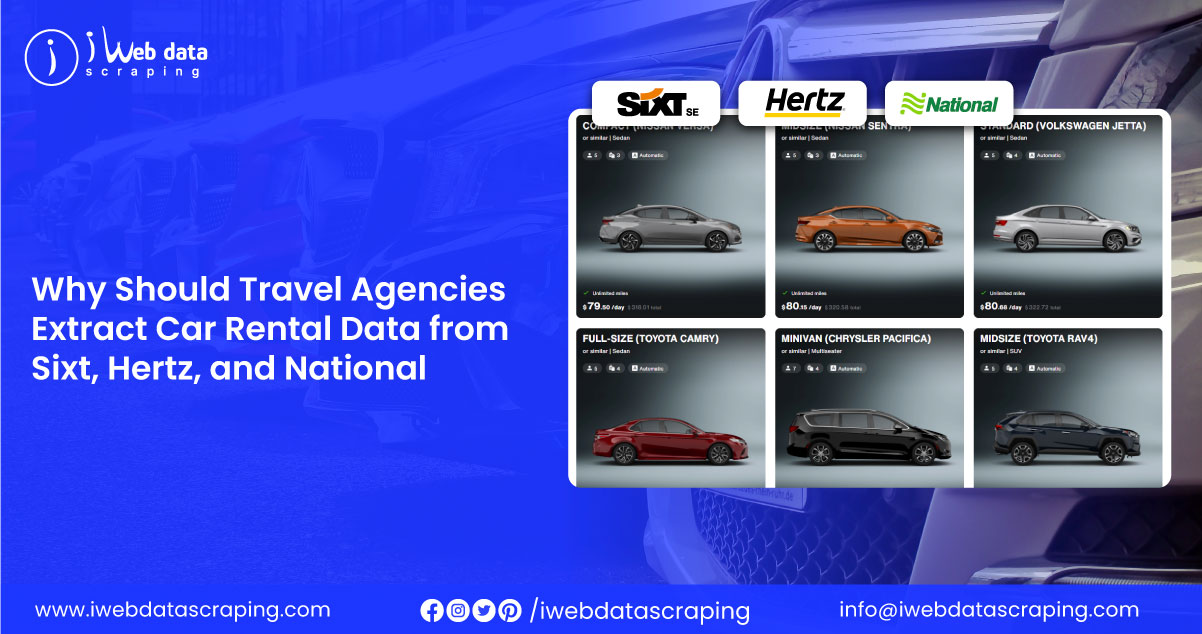
Car rental companies like Sixt, Hertz, and National have emerged as dominant players in the global transportation landscape. The ability to extract car rental data from Sixt, Hertz, and National has become increasingly vital for businesses and consumers, offering insights into pricing trends, fleet availability, customer preferences, and more. This article delves into the significance of web scraping car rental data from Sixt, Hertz, and National, its applications, challenges, and the potential for industries reliant on transportation data.
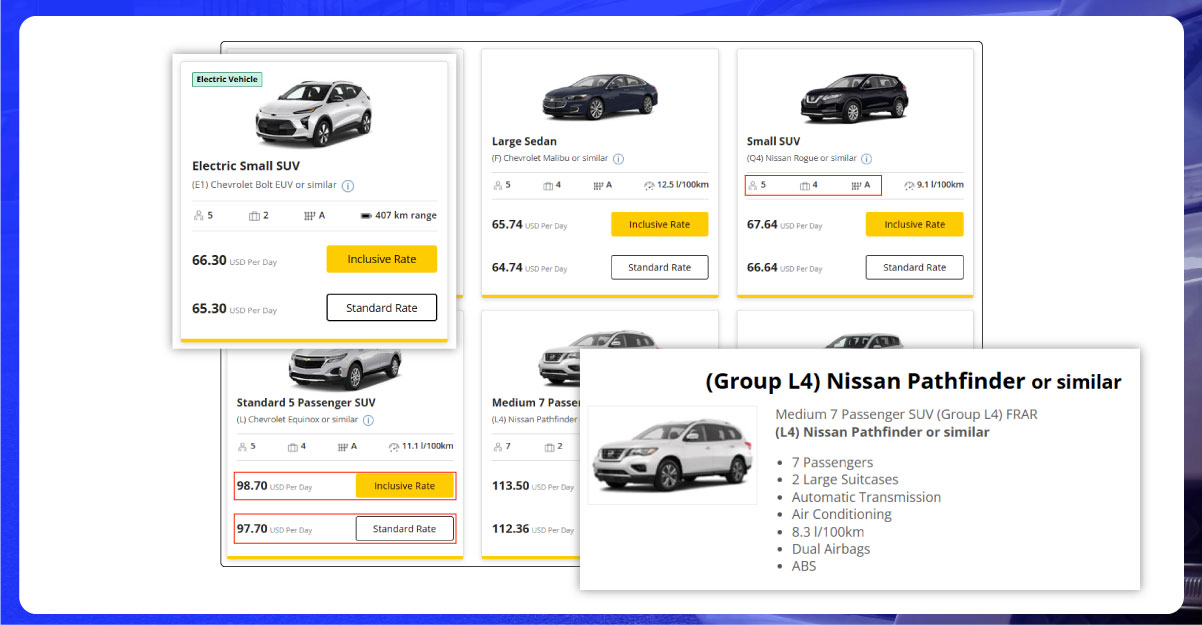
Car rental data extraction is gathering valuable information from car rental websites and apps. This data typically includes car models, rental rates, vehicle availability, locations, rental policies, insurance options, and customer reviews. This information is invaluable for businesses in making strategic decisions about pricing, competition analysis, and customer satisfaction.
From a consumer perspective, rental data allows consumers to compare prices and services between companies, helping them make informed choices when booking a vehicle. Additionally, industries like travel aggregators, market research firms, and automotive businesses can leverage this data for various purposes, including trend analysis, fleet management, and operational efficiency.
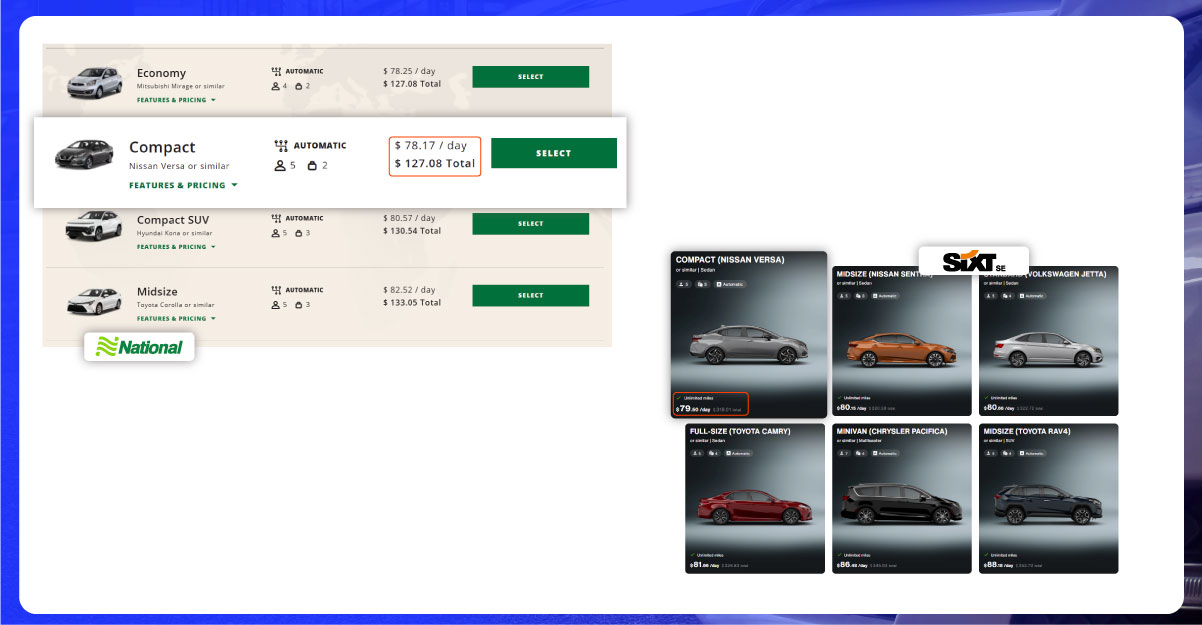
For several compelling reasons, travel agencies should consider extracting car rental data from Sixt, Hertz, and National. First and foremost, this data enables agencies to offer their clients competitive pricing and tailored packages. By analyzing rental rates and vehicle availability across these leading companies, agencies can identify the best deals, ensuring customers receive the most value for their money.
Additionally, extracting car rental data provides insights into consumer preferences and market trends. Agencies can determine which vehicle types are most popular in specific locations or during certain seasons, allowing them to optimize their offerings and marketing strategies accordingly. This data-driven approach enhances customer satisfaction and drives repeat business.
Furthermore, having access to real-time data on fleet availability helps agencies efficiently manage bookings and avoid over-promising vehicle options to clients. This transparency fosters trust between the agency and its customers.
Lastly, by leveraging data from Sixt, Hertz, and National, travel agencies can establish partnerships or negotiate better terms with these car rental providers. This can lead to exclusive deals and improved service offerings, ultimately enhancing the agency's reputation in a competitive market. In summary, extracting car rental data is essential for optimizing operations and delivering exceptional customer experiences.
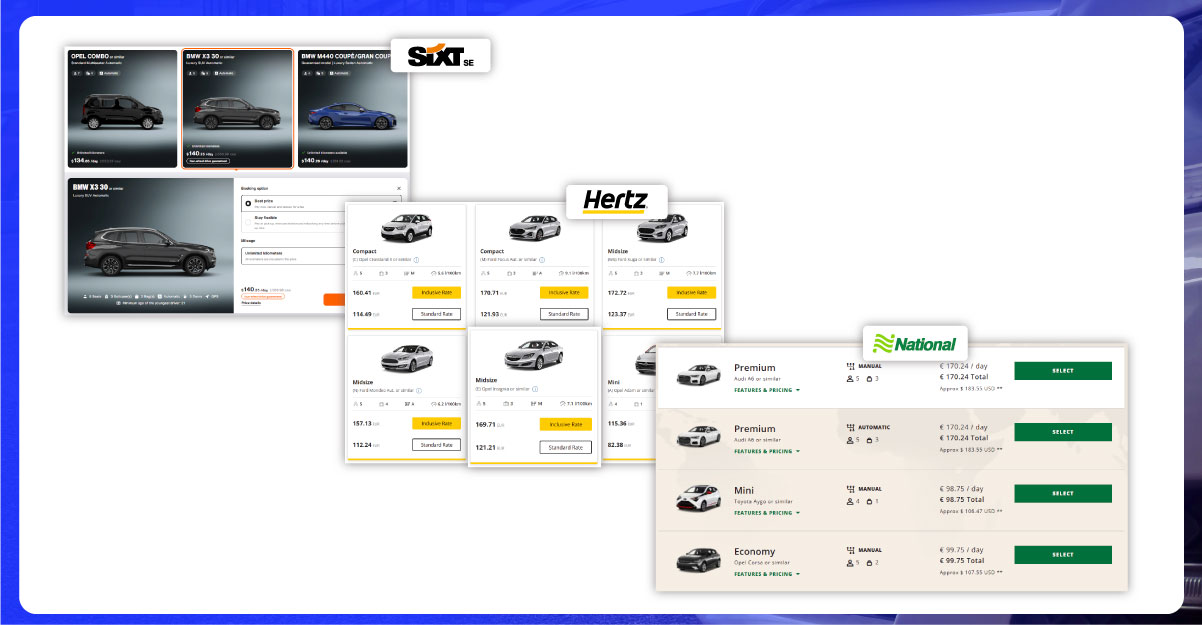
Sixt, Hertz, and National are three of the largest and most well-established car rental companies globally, making them ideal data sources for analysis. These companies cater to business and leisure travelers, offering various vehicles, services, and locations. By extracting data from these platforms, businesses can gain comprehensive insights into the global car rental market.
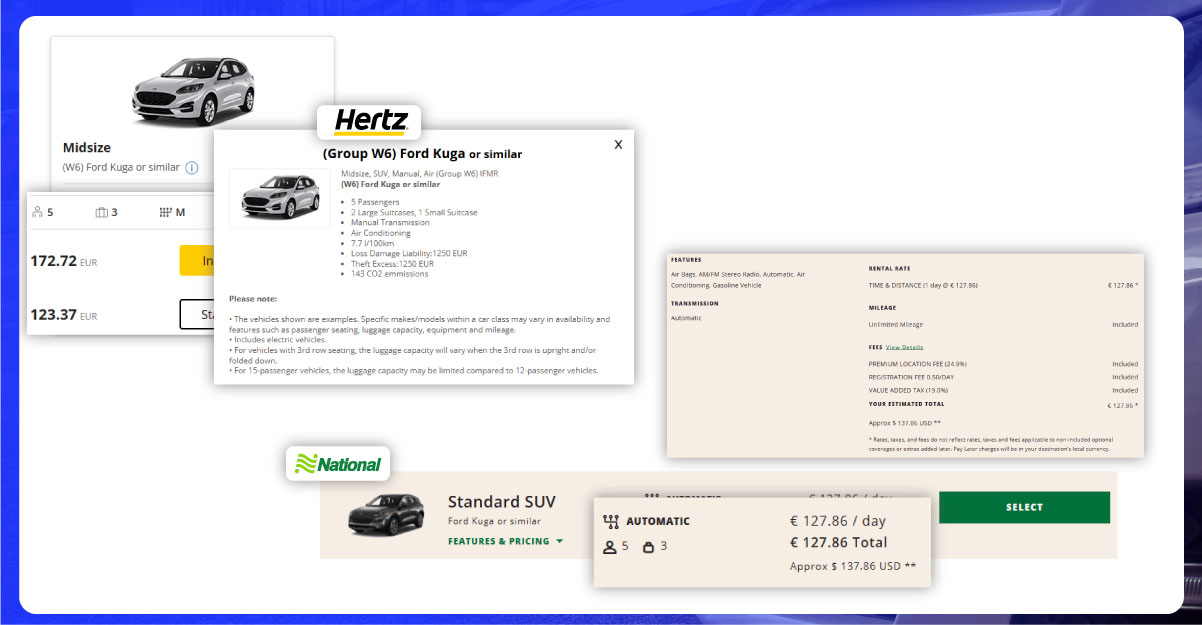
Travel agencies extract car rental data from Sixt, Hertz, and National to optimize pricing, analyze consumer preferences, and enhance service offerings. This data-driven approach helps agencies provide competitive deals, ensure customer satisfaction, and foster stronger client relationships in a competitive market.
1. Price Comparison and Competitive Analysis: One of the most common uses of extracted car rental data is price comparison. By analyzing the rates offered by Sixt, Hertz, and National using car rental data scraping services, businesses and consumers can compare the cost of renting vehicles in different locations, during various seasons, or for different vehicle types. This competitive analysis is vital for companies looking to optimize their pricing strategies or offer better deals to attract customers.
2. Market Trends and Consumer Preferences: Rental data also reveals patterns and trends in consumer behavior. For instance, which types of cars are most popular in specific locations? Do travelers prefer renting economy cars in metropolitan areas, or are they more likely to rent SUVs for road trips in rural or scenic locations? Businesses can predict trends by analyzing car rental price datasets, helping rental companies adjust their fleet composition or promote specific vehicle types at the right time.
3. Fleet Management and Availability: Efficient fleet management is essential for car rental companies. Extracting data from platforms like Sixt, Hertz, and National helps these companies track vehicle availability, demand fluctuations, and maintenance requirements. This data can determine when and where to move vehicles, ensuring optimal availability in high-demand locations while minimizing idle inventory in low- demand areas.
4. Customer Insights and Behavior Analysis: Another significant advantage of car rental data extraction is understanding customer preferences and behavior. By analyzing factors such as booking times, preferred rental durations, vehicle choices, and feedback using car rental data scraper, businesses can tailor their services to meet customer needs more effectively. This can improve customer satisfaction, increase loyalty, and improve service delivery.
5. Insurance and Policy Monitoring: Car rental companies often offer insurance packages alongside their rentals. Extract car rental website data to allow businesses to monitor the different insurance options offered by Sixt, Hertz, and National. Insurance companies or travel agencies can then use this data to create competitive offers or to ensure compliance with industry regulations.
6. Travel Industry Integration: Car rental data is crucial for travel aggregators and booking platforms. These platforms use extracted data to offer users seamless comparisons between rental providers. Integrating Sixt, Hertz, and National data allows travelers to make informed decisions about vehicle choice, pricing, and service quality. This integration can improve user experience, reduce booking friction, and drive traffic to rental companies and third-party platforms.
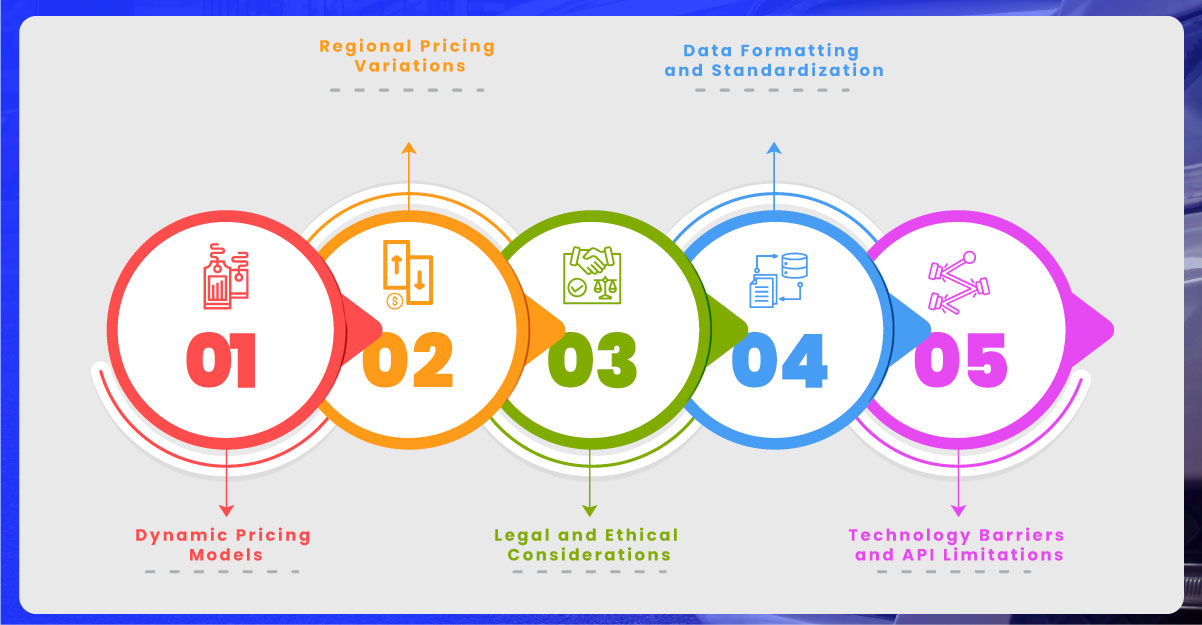
While extracting car rental data provides numerous advantages, it also presents challenges that businesses must navigate.
1. Dynamic Pricing Models: Car rental companies often use dynamic pricing, adjusting their rates based on demand, seasonality, or special events. This makes capturing consistent data difficult, as prices fluctuate frequently. For instance, a price recorded at 8 AM could differ by noon. Data extraction tools must be capable of handling these fluctuations and providing up-to-date pricing information.
2. Regional Pricing Variations: Sixt, Hertz, and National operate globally, with different pricing models based on location. A vehicle that costs $50 a day in the United States might cost significantly more or less in Europe or Asia. Extracting data from these platforms requires understanding the regional variations and normalizing the data to ensure accurate comparisons across geographies.
3. Legal and Ethical Considerations: Extracting data from car rental platforms can raise legal and ethical concerns. Many companies have policies against data scraping, citing intellectual property and user privacy issues. Businesses extracting data must comply with Sixt, Hertz, and National's terms of service and data privacy regulations like GDPR and CCPA. Legal repercussions can be severe if proper protocols are not followed.
4. Data Formatting and Standardization: Car rental data from Sixt, Hertz, and National may come in different formats with varying terminologies and metrics. For example, how vehicle categories are defined may differ between companies or the rental rates might be presented in different currencies or units. Data extraction tools must be able to standardize this information to ensure accurate comparisons and analyses.
5. Technology Barriers and API Limitations: Car rental platforms often have measures in place to limit data scraping. They may use CAPTCHA systems, rate limiting, or blocking IP addresses that exhibit suspicious behavior. Additionally, not all platforms offer API access, which makes data extraction more difficult. Businesses must employ sophisticated scraping tools and techniques to navigate these obstacles without violating the platforms' terms of service.
The extraction of car rental data from Sixt, Hertz, and National offers immense potential for businesses and consumers. From price comparison and competitive analysis to fleet management and customer insights, the applications of this data are wide-ranging. However, extracting this data is not without its challenges. Dynamic pricing, regional variations, legal considerations, and technology barriers pose significant hurdles.
As the car rental industry continues to evolve, the ability to extract and analyze data from these platforms will become even more critical. Whether for optimizing pricing strategies, enhancing customer experience, or driving innovation in travel and fleet management, the insights gained from car rental data can offer a competitive edge. For businesses and researchers looking to leverage this data, it is crucial to stay updated on the latest tools, technologies, and regulations in the ever-changing landscape of data extraction.
Experience top-notch web scraping service and mobile app scraping solutions with iWeb Data Scraping. Our skilled team excels in extracting various data sets, including retail store locations and beyond. Connect with us today to learn how our customized services can address your unique project needs, delivering the highest efficiency and dependability for all your data requirements.